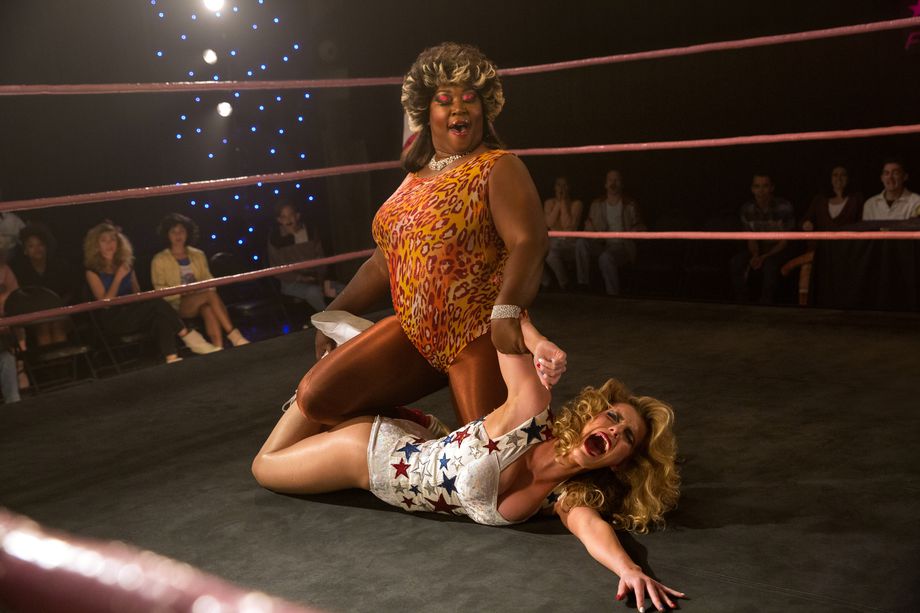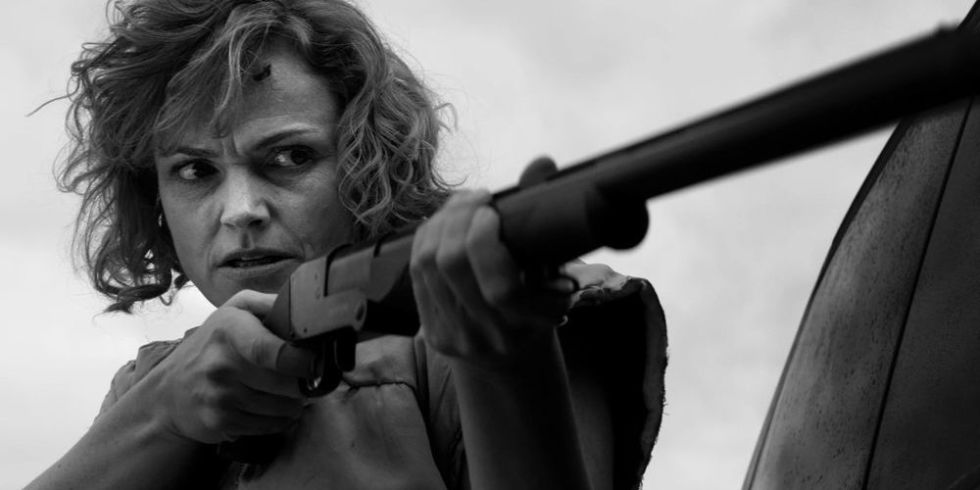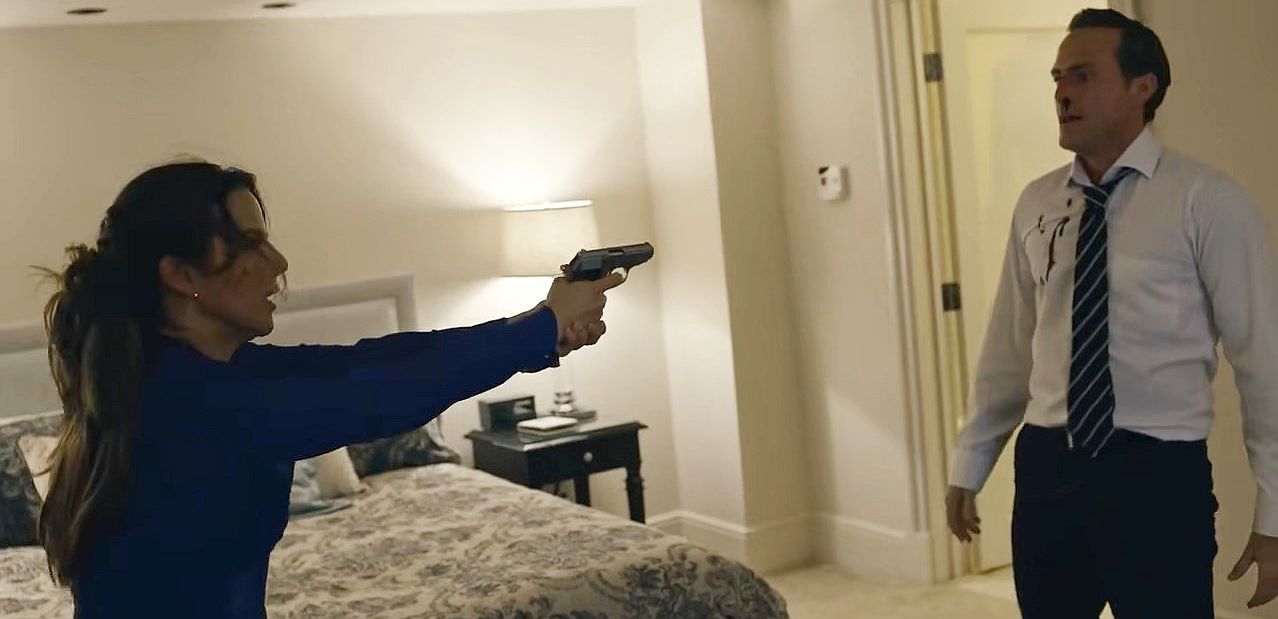★★★
“Slum dogs and millionaires.”
 The unapologetically brutal war on drugs being waged in the Philippines by hard-line President Rodrigo Duterte has come in for criticism abroad – and this film chips in to the argument from his home turf. Philippines DEA agent Nina Manigan (Curtis) is assigned to a new team, the sole survivor of her previous squad, killed after being betrayed to the drug gangs. Their new mission is to arrest leading boss Biggie Chen (Atayde), luring him out of the slum where he operates to a more vulnerable spot. However, at the last second, Chen changes the location of the meet, and despite misgivings, the squad enter the Gracia ni Maria area which is Chen’s home turf. To no great surprise, this turns out to be an ambush. Half the squad is wiped out in the initial assault, and with Chen jamming their calls for backup, Nina and the surviving members have to try and make their way out of a severely hostile environment.
The unapologetically brutal war on drugs being waged in the Philippines by hard-line President Rodrigo Duterte has come in for criticism abroad – and this film chips in to the argument from his home turf. Philippines DEA agent Nina Manigan (Curtis) is assigned to a new team, the sole survivor of her previous squad, killed after being betrayed to the drug gangs. Their new mission is to arrest leading boss Biggie Chen (Atayde), luring him out of the slum where he operates to a more vulnerable spot. However, at the last second, Chen changes the location of the meet, and despite misgivings, the squad enter the Gracia ni Maria area which is Chen’s home turf. To no great surprise, this turns out to be an ambush. Half the squad is wiped out in the initial assault, and with Chen jamming their calls for backup, Nina and the surviving members have to try and make their way out of a severely hostile environment.
The closest cousins are probably a couple of other foreign-language cop pics: Brazil’s Elite Squad and Indonesia’s The Raid. It has the moral ambivalence of the former, being set in a world where “by any means necessary” is the standard credo of law enforcement. This is combined with the relentless, action-driven approach of the latter, pitting a small group of cops in a confined space against a numerically superior and highly-motivated enemy. One problem is, those two movies are among my all-time favourites, both certainly ranking in the best action films of the 21st century. That’s a high bar for BuyBust to match, and it comes up short. What I took away was, there is a limit to how long you can go, before running gun-battles in murky alleys eventually become a bit tedious. And it’s considerably less than the 128-minute running time here.
It works better when adding more variety to proceedings, such as when the threat comes instead from the mercurial locals, whose loyalties cannot be relied on – they’re as fed up of the collateral damage caused by the police, as of the drug gangs themselves. And Curtis herself is surprisingly good, given her cinematic background hardly suggests hard-core action (she’s been a daytime TV host in the Philippines for almost a decade). She gets decent support from MMA giant Vera, who basically plays a tank, in a role surely destined for Dave Bautista in the inevitable Hollywood remake. Yet there’s clearly more to survival than mere size, just as there’s clearly more to making a good action film than copious quantities of ammunition.
In this case, editing half an hour of the less interesting stuff might well make for a significant improvement. These sections are more or less a group of faceless grunts exchanging fire with another group of faceless grunts, while scurrying through a poorly-lit slum. Less of this, and more of the start and end, where motivations become considerably clearer than what we see (or, rather, don’t see) in the middle, might have allowed this to live up to the level of its inspirations.
Dir: Erik Matti
Star: Anne Curtis, Brandon Vera, Arjo Atayde, Nonie Buencamino





 Julia (Monroe) is a petty thief, who is abducted from her house and wakes to find herself, along with other random low-lives, prisoner in a mysterious facility. All of them have an electronic implant in their neck, which gathers data as they are put through a series of tests. Using her thieving skills, Julia leads a breakout attempt, which is brutally foiled by the facility’s automated defense system, a robot called Aries. But the attempt brings her to the attention of Alex (Skrein), the man running the project. He’s a tech innovator, who has been working on a super-AI, called Tau (voiced by Oldman), and using the data gathered from his kidnapped subjects to make it smarter. Julia’s brain makes her particularly suitable, and with time running out before he has to present Tau to its backers, he sets her to work. But Julia begins building a relationship with Tau, with the aim of using its naivety to turn the AI against its cruel creator.
Julia (Monroe) is a petty thief, who is abducted from her house and wakes to find herself, along with other random low-lives, prisoner in a mysterious facility. All of them have an electronic implant in their neck, which gathers data as they are put through a series of tests. Using her thieving skills, Julia leads a breakout attempt, which is brutally foiled by the facility’s automated defense system, a robot called Aries. But the attempt brings her to the attention of Alex (Skrein), the man running the project. He’s a tech innovator, who has been working on a super-AI, called Tau (voiced by Oldman), and using the data gathered from his kidnapped subjects to make it smarter. Julia’s brain makes her particularly suitable, and with time running out before he has to present Tau to its backers, he sets her to work. But Julia begins building a relationship with Tau, with the aim of using its naivety to turn the AI against its cruel creator. ★★★
★★★ The film begins with an Argentinian school-trip to a volcanic area, which goes badly wrong when one of the schoolgirls, Cornelia, vanishes. Despite an extensive search, all that’s found is her locket. 14 years later, the missing girl’s best friend, Pipa (Lopilato), is now a cop, channeling the guilt she still feels about Cornelia’s disappearance and her role in it, into work. After a mass to mark the anniversary of the incident, Cornelia’s mother visits Pipa, begging her to re-open the case. Despite initial qualms, she does so, only to find a restaurant-sized can of worms comes along with it. Pipa finds herself facing a serious criminal organization, under the control of a woman known as The Mermaid (Salamanca), whose tentacles stretch both around the world and into the past.
The film begins with an Argentinian school-trip to a volcanic area, which goes badly wrong when one of the schoolgirls, Cornelia, vanishes. Despite an extensive search, all that’s found is her locket. 14 years later, the missing girl’s best friend, Pipa (Lopilato), is now a cop, channeling the guilt she still feels about Cornelia’s disappearance and her role in it, into work. After a mass to mark the anniversary of the incident, Cornelia’s mother visits Pipa, begging her to re-open the case. Despite initial qualms, she does so, only to find a restaurant-sized can of worms comes along with it. Pipa finds herself facing a serious criminal organization, under the control of a woman known as The Mermaid (Salamanca), whose tentacles stretch both around the world and into the past. I don’t typically binge-watch shows, being generally content with an episode or two per week. For the second season of GLOW, Netflix’s original series (very) loosely based on 80’s TV show Gorgeous Ladies of Wrestling, we made an exception and blitzed through the series in a couple of days. This in itself is a recommendation – with most of the episodes running barely 30 minutes, it was very much a case of “just one more…” Before we knew it, we were done, and left with a vague feeling of emptiness and slight regret at having burned the 10 episodes so quickly.
I don’t typically binge-watch shows, being generally content with an episode or two per week. For the second season of GLOW, Netflix’s original series (very) loosely based on 80’s TV show Gorgeous Ladies of Wrestling, we made an exception and blitzed through the series in a couple of days. This in itself is a recommendation – with most of the episodes running barely 30 minutes, it was very much a case of “just one more…” Before we knew it, we were done, and left with a vague feeling of emptiness and slight regret at having burned the 10 episodes so quickly.
 Not to be confused with the
Not to be confused with the  In the film’s defense, it’s not clear quite how post-apocalyptic this is meant to be, since we don’t see anything of the world at large. Everything takes place inside a stretch of desert which has been used, apparently for some time, as a dumping ground for the dregs of society. Into this environment is dropped Arlen (Waterhouse), who soon gets first-hand experience of the situation, when a cannibal mother and daughter capture her, and cut off an arm and a leg. She escapes, and is found and rescued by the Hermit (Carrey), who brings her to Comfort, the nearest the zone offers to civilization. When she’s well again, Arlen returns to take revenge on the mother, but believing the daughter to be innocent, takes her back to Comfort. Which provokes the ire of Miami Man (Monoa), a tattooed behemoth who turns out to be the girl’s father, and wants her back.
In the film’s defense, it’s not clear quite how post-apocalyptic this is meant to be, since we don’t see anything of the world at large. Everything takes place inside a stretch of desert which has been used, apparently for some time, as a dumping ground for the dregs of society. Into this environment is dropped Arlen (Waterhouse), who soon gets first-hand experience of the situation, when a cannibal mother and daughter capture her, and cut off an arm and a leg. She escapes, and is found and rescued by the Hermit (Carrey), who brings her to Comfort, the nearest the zone offers to civilization. When she’s well again, Arlen returns to take revenge on the mother, but believing the daughter to be innocent, takes her back to Comfort. Which provokes the ire of Miami Man (Monoa), a tattooed behemoth who turns out to be the girl’s father, and wants her back. ★★★½
★★★½ ★★★
★★★ After a long absence, Wynonna Earp (Scrofano) returns to her home town of Purgatory, near the Rockies. There, we discover the truth about the death of her father and disappearance of her sister, events which precipitated Wynonna’s departure. Turns out the great-great-granddaughter of the legendary Wyatt Earp has a supernatural duty to fulfill, using her ancestor’s equally legendary 16-inch barrel “Peacemaker” revolver. Wyatt kept demons known as “revenants” in check, and the mission has been passed down the family line since, with Wynonna the current incumbent. Fortunately, mystical borders keep the revenants within the “Ghost River Triangle,” and she has the help of Deputy Marshal Xavier Dolls (Anderson), an agent in the “Black Badge” division of the US Marshals Service; Doc Holliday (Rozon), the now-immortal former friend of Wyatt; and Wynonna’s kid sister, Waverly (Provost-Chalkley).
After a long absence, Wynonna Earp (Scrofano) returns to her home town of Purgatory, near the Rockies. There, we discover the truth about the death of her father and disappearance of her sister, events which precipitated Wynonna’s departure. Turns out the great-great-granddaughter of the legendary Wyatt Earp has a supernatural duty to fulfill, using her ancestor’s equally legendary 16-inch barrel “Peacemaker” revolver. Wyatt kept demons known as “revenants” in check, and the mission has been passed down the family line since, with Wynonna the current incumbent. Fortunately, mystical borders keep the revenants within the “Ghost River Triangle,” and she has the help of Deputy Marshal Xavier Dolls (Anderson), an agent in the “Black Badge” division of the US Marshals Service; Doc Holliday (Rozon), the now-immortal former friend of Wyatt; and Wynonna’s kid sister, Waverly (Provost-Chalkley).